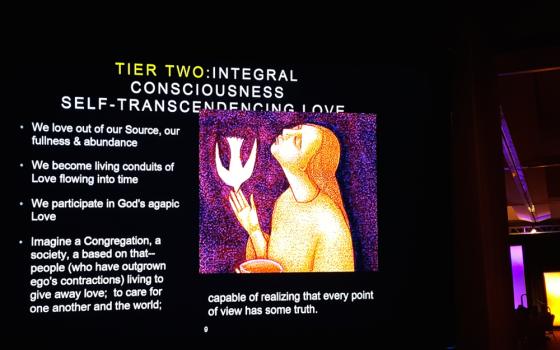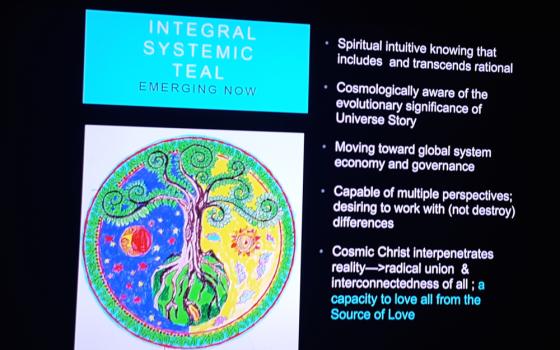"See I am doing something new – now it springs forth. Do you not perceive it?"
- Isaiah 43:19
During the first full day of the 2016 Leadership Conference of Women Religious assembly, August 10, participants were challenged to explore the future of religious life and reinvent the annual gathering in the face of rapidly declining membership.
LCWR President Marcia Allen minced no words in describing the demographic reality confronting women religious in the U.S. In her address to the approximately 800 attendees in Atlanta, she wove a series of vignettes focused on the theme of this year’s assembly: "Embracing the Mystery - Living Transformation."
"We are keeping a brave face on it, but the truth is that the very thing that makes the conference possible and necessary is disappearing," Allen said. The Sister of St. Joseph cited data from the National Religious Retirement Office, showing the number of men and women religious in the U.S. has dropped from 107,000 to 49,000 in the last 20 years — and will be fewer than 29,000 by 2025.
And yet, Allen said, this is not a cause for despair.
"I have long been operating on Johannes Metz's theory that we are not in a crisis of numbers of vocations but in a 'crisis of function,'" she said. Sisters are constantly inventing new ways to meet the needs of the time, she added, even if that hasn't made them younger or given them crowds of new members.
Drawing on works of historians, theologians and scientists, Allen presented images and allegories designed to help attendees imagine what LCWR could be in a post-contemporary world. "What we learned through from the apostolic visitation and the doctrinal investigation is that women religious all over the country and throughout the world benefit from this conference."
Allen referred back to Immaculate Heart of Mary Sr. Sharon Holland's presidential address from last year’s assembly, the refrain of which — avanti, that is, forward — the crowd recalled without prompting. "Avanti!" they cheered.
"What does 'avanti' mean in face of such collapse?" Allen asked the LCWR membership. "What is he responsibility of those of us gathered here, not next year, but today?"
To help answer that, Allen led the membership in a contemplative exercise, noting that the ideas they dreamed would be considered as LCWR undergoes a process of systems analysis.
"This day, you have invented or at least paved the way for a new tradition," Allen said at the end of the exercise. "You have banked your future on the horizon of expectation. You have sung a new song. You have emerged new. Now there is a future and a people for it."
One sister let out a vocal "wow" as the rest of the room rose to their feet for the outgoing president.
Similar themes emerged in leadership expert Margaret Wheatley address eariler that day. Titled "Finding Ground in the Age of Groundlessness," Wheatley's talk outlined the need for leaders to take time for contemplation in a world that promotes "constant reactivity" rather than thought.
"How we approach this time when the very fabric of society is being ripped apart by conflict and polarization, how we are in that groundlessness — for me, speaking very personally, I can only be in it because I have spent months in contemplation," she said, noting that spends about a third of the year living in contemplative retreat.
Wheatley said she considers women religious to be the greatest female leaders on the planet, but in order for them to be a presence of peace and love in the world, sisters must be willing to live from a contemplative stance — which may require a new way of viewing ministry.
"You live a vowed life," she said. "What a vow does — it doesn’t give us the hope of results, it gives us the container for our life . . . we cannot be tied to a hope for results. Someone said expectations of change are just premeditated disappointments."
To process Wheatley's address, LCWR members met in groups of six to engage in a period of contemplative dialogue or deep listening. Afterward, Sweeney shared with the membership body some of the thoughts and ideas that came out of the groups.
Many of the sisters said they were inspired or in awe, while others mentioned they were humbled. Sweeney mentioned that a recurring theme was that although the sisters were dialoguing with groups of strangers, many noted feeling unafraid to share.
Sweeney and Sister of Notre Dame Catherine Bertrand are facilitating the contemplative dialogue process at the assembly. Setting the stage for what contemplative dialogue can do for women religious, Sweeney also gave a presentation on the evolution of human consciousness and what that means for women religious. The highest level of human evolution, Sweeney said, is the level at which one lives to give away love, knows that every point of view has some truth and understands Christ as the Cosmic Christ who "interpenetrates" reality.
"I think more than 50 percent of the people in this room are already living at [this level]," Sweeney said. "I think this is the new frontier for women religious, to be part of the tipping point." She said the mission for women religious today is to foster the evolution of love.
She also reminded participants that in order for contemplative dialogue and communal discernment to be successful, it first needs to be cultivated "in the culture of we." Dialogue, creative thinking, mutual respect, reference, listening are all hallmarks of the culture necessary, she said. "It is so, so important — if we’re ever going to be able to do communal discernment is that we weave 'the culture of we' — and don’t move on when that is not in harmony," she said. "When there's not a coherence among us it’s a signal that we have to stop and work at that coherence."
"We are evolving as individuals and as communities," she said. "Individuals cannot evolve by themselves. We need to evolve as a community to make a difference in the world."
In 1965, when the organization that became LCWR began, "We were already part of the evolutionary shift and here we are in 2016. We’ve changed outwardly but we've changed just as much inwardly. We actually have new structures of consciousness that we did not have earlier. When we come together as coherent, intentional communities, we have access to a source of wisdom beyond us, that wants to act through us. So trusting the 'we' holds much more than any 'I' — and when we share our thinking and feeling through discernment, we are making a transformative change in the world."
Sweeney offered another brief reflection on the day's contemplative activites to close out Wednesday's public events. The membership then moved into a closed executive session to discuss candidates for LCWR president-elect.
On Thursday, August 11, former LCWR president Franciscan Sr. Pat Farrell, will give the second keynote address.
The LCWR assembly continues through Friday's banquet and Outstanding Leadership Award. Global Sisters Report will have daily recaps and will be tweeting updates at @sistersreport
[Dawn Araujo-Hawkins is Global Sisters Report staff writer based in Kansas City, Missouri. Follow her on Twitter @dawn_cherie]
Addresses can be found as they are uploaded on LCWR's site.





